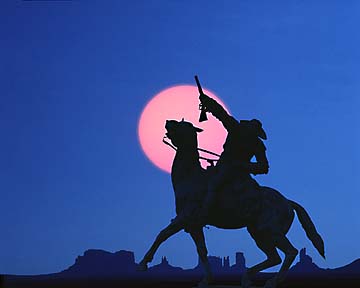Colonel John P. Slough, a Denver attorney turned soldier, was commanding officer of the First Colorado Infantry. He dispatched his battle report to Colonel Edward S. Canby the day after the fight at Pigeon's Ranch.

Col. John P. Slough, First Colorado Volunteers, Commander of Union troops during Battle of Glorieta Pass (courtesy Colorado Historical Society).
Kozlowski's Ranch, March 29, 1862
COLONEL: Learning from our spies that the enemy, about 1000 strong, were in the Apache Canon [sic] and at Johnson's Ranch beyond, I concluded to reconnoiter in force, with a view of ascertaining the position of the enemy and of harassing them as much as possible; hence left this place with my command, nearly 1,300 strong, at 8 o'clock yesterday morning. To facilitate the reconnaissance I sent Maj. J.M. Chivington...with about 430 officers and picked men, with instructions to push forward to Johnson's. With the remainder of the command I entered the canon, and had attained but a short distance when our pickets announced that the enemy was near and had taken position in a thick grove of trees, with their line extending from mesa to mesa across the canon, and their battery, consisting of four pieces, placed in position. I at once detailed a considerable force of flankers, placed the batteries in position, and placed the cavalry--nearly all dismounted--and the remainder of the infantry in position to support the batteries.

Sharpshooters Ridge Col. John Slough posted Capt. Charles Walker and Company E. Third Cavalry on the crest of sharpshooters ridge. Although it was a good position to defend from attack with its large rocks, almost vertical south face and steep eastern slope, the Federals were driven off by Maj. Pyron and the Second Texas Mounted Rifle. Most of the federal defenders of sharpshooters ridge were able to escape as the Confederates took the ridge. Walker's men mounted their horses and escorted Col. Slough east back along the Santa Fe Trail to another defensive position
Before the arrangement of my forces was completed the enemy opened fire upon us. The action began about 10 o'clock and continued until after 4 p.m. The character of the country was such as to make the engagement of the bushwhacking kind. Hearing of the success of Major Chivington's command, and the object of our movement being successful, we fell back in order to our camp. Our loss in killed is probably 20...; in wounded probably 50...; in missing probably over 100. In addition we took some 25 prisoners and rendered unfit for service three pieces of their artillery. We took and destroyed their train of about 60 wagons, with their contents, consisting of ammunition, subsistence, forage, clothing, officers' baggage, etc.... During the engagements the enemy made three attempts to take our batteries and were repelled in each with severe loss.

Reenactors on Sharpshooter's Ridge above Pigeon's Ranch, Glorieta Battlefield
The strength of the enemy, as received from spies and prisoners, in the canon was altogether some 1,200 or 1,300, some 200 of whom were at or near Johnson's Ranch, and were engaged by Major Chivington's command. The officers and men behaved nobly. My thanks are due to my staff officers for the courage and ability with which they assisted me in conducting the engagement. As soon as all the details are ascertained I will send an official report of the engagement.
After the retreat of his army to Santa Fe from the battlefield at Glorieta Pass, Colonel Scurry reported what he considered a Confederate victory to General Sibley.

Col. William Scurry, Fourth Texas Mounted Volunteers, Commander of Confederate troops during the Battle of Glorieta Pass (courtesy National Archives).
Santa Fe, N. Mex., March 30, 1862
GENERAL: I arrived here this morning with my command and have taken quarters for the present in this city. I will in a short time give you an official account of the battle of Glorieta, which occurred on day before yesterday, in the Canon [sic] Glorieta, about 22 miles from this city, ...when another victory was added to the long list of Confederate triumphs.
The action commenced at about 11 o'clock and ended at 5:30, and, although every inch of the ground was well contested, we steadily drove them back until they were in full retreat our men pursuing until from sheer exhaustion we were compelled to stop.

Johnson's Ranch Major Chivington's Federal party hiked down the steep mountainside above the campsite to burn the Confederate wagon train parked in the creek bottom
Our loss was 33 killed and I believe, 35 wounded. ...Major Pyron had his horse shot under him, and my own cheek was twice brushed by a Minie ball, each time drawing blood, and my clothes torn in two places. I mentioned this simply to show how hot was the fire of the enemy when all of the field officers upon the ground were either killed or touched....
Our train was burned by a party who succeeded in passing undiscovered around the mountains to our rear. ...The loss of the enemy was very severe, being over 75 killed and a large number wounded.
The loss of my supplies so crippled me that after burying my dead I was unable to follow up the victory. My men for two days went unfed and blanketless unmurmuringly. I was compelled to come here for something to eat. At last accounts the Federalists were still retiring towards Fort Union. The men at the train blew up the limber-box and spiked the 6-pounder I had left at the train, so that it was rendered useless, and the cart-burners left it.
...From three sources, all believed to be reliable, Canby left Craig on the 24th. Yours in haste, W.R. SCURRY
P.S. I do not know if I write intelligently. I have not slept for three nights, and can scarcely hold my eyes open. W.R.S
Additional Sources:
history.sandiego.edu
www.npca.org
pgnagle.com
www.civilwaralbum.com




